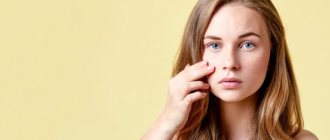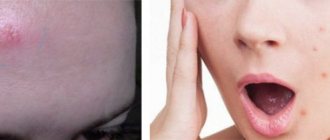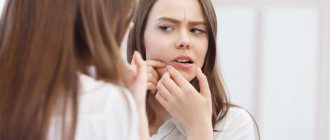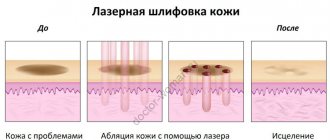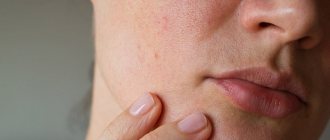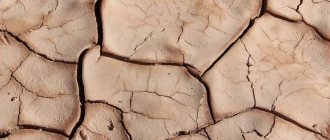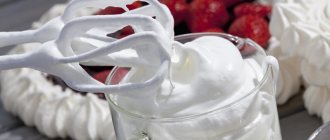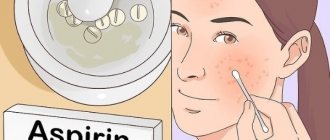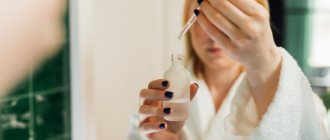Reasons for lack of results in acne treatment:
Home care is also often a problem. There are options when home care is not adjusted at all, and the patient continues to torture his skin with all available and advertised products, or there is no care at all. Of these two evils, lack of care is perhaps the best option. One common mistake is hoping to get rid of acne only with the help of a treatment, such as a medicated cream.
cosmetologist Yuliana Shiyan
Comment from a cosmetologist:I often hear during consultations: “I tried this cream, it didn’t help me . It is obvious that the patient has unrealistic hopes for the cream. Therapeutic home care, of course, will contribute to cleansing the skin, but this is an auxiliary element, and not the basis of treatment. Just like procedures, they are a vital element in treatment, but in themselves they provide only a short-term effect. Everything should be in moderation and in totality.
Constant change of doctors during treatment
I have been working with problem skin for many years and I can certainly say that this is one of the most common reasons. Sometimes there is a need to change a doctor when there are doubts about the doctor’s competence. And more often, the patient goes from doctor to doctor because no one prescribes a magic pill and after a couple of cleanings for some reason there is no result or drugs are prescribed that the patient is afraid to take. And every time, the next dermatologist (cosmetologist) starts from scratch. As a result, the result is zero, invaluable time wasted, and as a result, complete disappointment!
Fear of taking prescribed treatment for acne
Acne. What to do?
Before a patient sees a doctor, he studies “a lot of things” on the Internet. The patient is infested with myths and negativity regarding combined oral contraceptives and retinoids, which are often the mainstay in the treatment of acne. And not just a basis, but irreplaceable drugs in most cases.
Practice shows that those who put off this treatment for years still decide on it in the end. And on top of years of torment from acne, you get severe scars and blemishes on your tormented skin, and of course, several courses of laser resurfacing to get rid of them.
You need to know that the doctor always prescribes treatment in proportion to the severity of the disease. If the cause of acne is a hormonal imbalance, you cannot do without COCs. If the acne is severe, then you can apply creams to your face and cleanse your intestines as much as you like; only retinoids will save you.
Amateur performance
Discontinue medications at the first signs of skin clearing. A good result is very relaxing. Quickly forgotten:
- that the ointment is prescribed for 6 months, not 3 months
- that the procedure is mandatory at each stage
- that you don’t need to take the first cream you see off the shelf
- that the New Year's table is for beloved relatives, but not for beloved skin
- “Cumulative dose of retinoids? What is this? Doctor, you probably just forgot to tell me..."
We completed the treatment and with a clear conscience returned to our previous diet and prohibited skin care (for example, oils or creams based on them). Many patients are convinced that high-quality skin treatment is a guarantee of the absence of acne in the future. And no matter how sad it is to talk about it, such conviction is often the fault of the attending physician.
Why? Because he didn't spend enough time explaining that acne susceptibility doesn't go away, even if your face clears up. After the main treatment, supportive, powerful home care is still prescribed for some time, continuing to work with the causes of acne, if it is nutrition and/or internal diseases.
Subcutaneous acne: causes and symptoms
The causes of subcutaneous rashes may be as follows29,50,41:
- Endocrine disorders. The work of the sebaceous glands is influenced by androgens. When testosterone levels rise, they produce more sebum, which can lead to breakouts.
- Heredity. It has been proven that if parents have suffered from acne, there is a high probability that the child will also show symptoms of the disease. In addition, there is genetically determined hyperandrogenism, which causes an increased level of sebum production and affects the processes of keratinization.
- Skin injury. Any mechanical impact on the skin can lead to the formation of rashes. We are talking not only about squeezing out acne, but also about frequent and prolonged rubbing of clothing straps, the habit of resting your chin with your hand, etc.
- Nutritional factors. The role of nutrition in the formation of rashes is still controversial. But there is still an opinion that for acne it is better to exclude milk, fatty meats, desserts, spicy and hot dishes. It is better to stick to a low glycemic index diet.
- Use of cosmetics with comedogenic components. The comedogenicity of individual ingredients in a cosmetic product is highly individual. So, in one person it can provoke acne, but in another it may not cause any negative reaction.
- Taking medications. Glucocorticoids, anabolic steroids, anti-epileptic drugs, even some vitamins can cause rashes.
Another factor influencing the formation of acne is hygiene. By itself, it does not cause acne, but it can help create favorable conditions for bacteria to multiply, increase sebum production, and clog pores. Moreover, this applies to both insufficiently frequent cleansing of the skin and frequent washing.
You need to understand that subcutaneous acne needs treatment. It must be pathogenetic, that is, affecting the links of pathogenesis. Clindovit® gel is active against propionibacteria, which cause acne, and also reduces the level of free fatty acids on the skin surface.6
To effectively combat acne, it is necessary to find out the causes that caused the disease and begin treatment on time.
How to get rid of acne at home using cosmetics
To get rid of acne forever, stock up not only with patience, but also with a decent arsenal of skincare products with sebum-regulating, exfoliating and anti-inflammatory ingredients. The minimum program is a gel or foam cleanser, makeup remover, toner, scrub and face mask.
Preparations with benzoyl peroxide –
Benzoyl peroxide is a bactericidal component and is probably the best remedy for acne (it can even be called the gold standard of therapy). This is a bactericidal component that effectively inhibits the growth of P. acnes bacteria, leading to the development of local inflammation in the area of hair follicles and the appearance of papules and pustules (pimples). It is very important that benzoyl peroxide, unlike antibiotics, does not cause the emergence of antibiotic-resistant microflora.
Professional pharmaceutical preparations with benzoyl peroxide are produced in the form of a gel (usually with a concentration of 2.5 or 5%). For the first month, in order to get the skin accustomed to benzoyl peroxide, it is optimal to use a concentration of 2.5%, and then switch to 5% of the product. If you use more concentrated products at once, irritation will likely appear on the skin. The classic monocomponent preparation with benzoyl peroxide 2.5 or 5% is Baziron-gel.
Combination drugs - but there are drugs where benzoyl peroxide is combined with an antibiotic or retinoid. As you will see below, each of these drugs will be effective in slightly different clinical situations, for example, depending on what type of inflammatory components (papules or pustules) you have. Examples of combination drugs for acne treatment:
- Indoxyl (UK) – benzoyl peroxide 5% + clindamycin 1%.
- Effezel (France) – benzoyl peroxide 2.5% + retinoid adapalene 0.1%.
How to choose the right drugs:
1) For mild to moderate papulopustular acne, the choice depends on the predominance of certain inflammatory elements. If papules predominate (without pus inside), then in this case the combination of “benzoyl peroxide + retinoid” will be optimal. For example, this could be the combination drug Effezel. But for patients with sensitive skin, it is better to use a combination of two monodrugs - benzoyl peroxide in the morning and a retinoid in the evening.
Thus, you can use the drug “Baziron” with benzene peroxide in the morning, and in the evening – one of two drugs “Klenzit” or “Differin” (containing the retinoid adapalene) of your choice. But if you have pustules with pus, then to the above combination of “benzoyl peroxide + retinoid” we also add external use of an antibiotic.
2) For severe papulopustular acne, we also use “benzoyl peroxide + retinoid” for external use, and also add systemic antibacterial therapy. Antibiotics for this form are used only orally, in long courses of up to 6-8 weeks (see above).
Side effects of benzoyl peroxide: Be aware that itching, burning sensation, dryness, tightness, redness, or flaking of the skin may occur after use. But usually these effects are not too pronounced. If you use the drug during active sunny periods, be sure to use sunscreen, because Benzoyl peroxide makes facial skin more sensitive to sunlight.
How to treat acne
As you understood from the previous block, there are many reasons for the appearance of acne. You can treat the external manifestations of acne as much as you like, but until the true cause of their appearance is found, all measures taken will only bring a temporary effect. Therefore, it is important to consult a doctor promptly, even at the first stage of the disease.
But you should understand that no doctor can just look at you, immediately name the cause and prescribe treatment. It is necessary to conduct a diagnosis to identify the true cause and select a treatment regimen that will be effective.
Be patient. It is not possible to cure acne in a couple of weeks. Therapy of several months is required to completely eliminate the cause of the inflammatory process and reduce the risk of relapse. Don't give up treatment halfway!
How to avoid comedones
- maintain hygiene , including regularly changing face towels and bed linen;
- avoid touching your face with your hands;
- normalize nutrition (avoid sweet, fatty, floury, fried foods and fast food), maintain a drinking regime, take vitamins;
- maintain a sleep schedule and try to avoid overwork and stress;
- do not neglect physical activity - this helps speed up metabolic processes, saturate cells with oxygen and remove toxins;
- to refuse from bad habits;
- use medications and medicinal products prescribed by a cosmetologist;
- monitor hormonal levels and avoid any changes;
- avoid prolonged exposure to the open sun;
- Do not self-medicate and do not use unproven methods of traditional medicine.
Chemical peeling
As mentioned above, light peelings can be carried out at home, however, more intense and, of course, effective chemical peels can only be carried out within the walls of a cosmetology clinic under the strict supervision of a cosmetologist to avoid skin burns. Chemical peeling exfoliates dead skin cells, tightens pores, and has an antiseptic and brightening effect.
Let's look at the most popular types of chemical peels.
Milk peeling is suitable for very sensitive skin. It can be done at any time of the year. Lactic acid is found in pickles and lactic acid fermentation products. In addition to it, the composition includes urea and a complex of amino acids. This peeling gently exfoliates and at the same time moisturizes the skin, and also stimulates the growth of new cells,
Almond can be on a gel or water-alcohol basis, and can also contain not only the main component (mandelic acid), but also other types of acids. Used to improve skin quality, regulate sebum production, reduce the appearance of wrinkles and age spots.
Azelaine peeling normalizes keratinization in the follicle ducts and sebum production, has an exfoliating, antibacterial and anti-inflammatory effect. It contains nonandioic, 1.7-heptanedicarboxylic acid, which is found in wheat, barley, lilac and other plants.
Glycolic and salicylic peels (AHA and BHA) are often performed simultaneously. In tandem, they have the maximum therapeutic effect: they not only cause the death of old cells, cause their desquamation, but also stimulate the production of natural collagen, as well as skin regeneration. They also discolor pigment spots and post-acne, improve metabolic processes.
Acne is associated with Propionbacterium acnes
Gram-positive propionic acne bacteria are constantly present on the skin. But under unfavorable conditions, they begin to actively multiply and cause inflammation in the pilosebaceous follicle.
Although the relationship between the abundance of P. acne and the severity of acne has not been established, colonization of the sebaceous glands by this bacterium can increase inflammation. Staphylococcusaureus, Staphylococcusepidermidis and other bacteria may also be involved in the development of the inflammatory reaction.
How to properly care for skin with open and closed comedones
If the skin is prone to oiliness and the formation of closed and open comedones, it requires special care. Necessary:
- wash your face and use alcohol-free tonics and lotions containing acids;
- minimize the use of foundation and other cosmetic products that clog pores;
- do self-massage and tone the skin with contrasting washes and showers;
- use sunscreen cosmetics;
- monitor cell renewal, use home peelings and special brushes for washing, do not bring the skin to a critical condition;
- moisturize and nourish the skin from the outside to avoid drying and peeling. Restoring the water balance of the epidermis is extremely important for successful treatment;
- squeeze out pimples yourself
- regularly , undergo all prescribed procedures and follow recommendations.
Why are allergies on the face dangerous?
A scattering of small specks or red spots not only look unsightly, but also pose a hidden threat. Acute inflammation, accompanied by swelling, can spread to the neck and make breathing difficult.
Violation of the structure of the skin, accompanied by a feeling of tightness, reduces the natural resistance to external influences. Weeping areas, as well as cracks in the upper layer of the epidermis, create a favorable environment for the proliferation of pathogenic bacteria, which leads to the appearance of pimples and ulcers. When such a condition occurs and is not treated, there is a high probability of it becoming chronic. In addition, an unpresentable appearance can cause a sensitive blow to pride and cause problems in communication.
If an allergic rash appears on the face, a specialist from a clinic or health center will tell you how to treat it. It is better to contact him at the first signs in order to make a timely diagnosis and receive an effective treatment regimen to avoid complications.
Treatment procedure using the M22 device
The treatment principle is based on the targeted action of light rays in the range of 311 nm. The phototherapy procedure is absolutely painless and safe, and at the same time very effective. There is no long recovery period required after it. Additional advantages are that one session only takes about 30 minutes, and the effect is targeted only to problem areas.
In addition to the treatment of comedones and acne, there is also photorejuvenation, pigmentation treatment, lifting, and also has an antiseptic effect. The necessary parameters are set on the device: wavelength and depth of exposure, radiation intensity, intervals between flashes and their duration. Before the procedure, the cosmetologist cleanses the skin, applies a conductive gel and protects the eyes of himself and the patient with special glasses.
The M22 hardware procedure is recommended not only for the treatment, but also for the prevention of acne.
Let's look at the main types of comedones
Open comedones are the so-called blackheads. They are pores clogged with oxidized sebum and keratinized cells with melanin particles. Because of this, they have a dark shade and dense structure.
Closed comedones are small white subcutaneous nodules. They are formed when the sebaceous ducts are blocked by dead skin cells and sebum. Unlike blackheads, in closed comedones the plug is formed subcutaneously, and the duct does not have an exit to the outside. Papules quite often become inflamed, also cause pain, and a reddish tint appears around them.
Both types of comedones spoil the appearance, form irregularities, pigment spots, and depressions (as a consequence), and improper treatment and removal can cause the appearance of new lesions.
Many comedones form acne - a disease of skin rashes.
It is important not to confuse closed comedones with milia (epidermal cystic formations), sebaceous adenomas (benign skin formations characteristic of adulthood) and allergic rashes. Getting rid of these types of skin diseases is possible only in a beauty salon, under the supervision of a doctor.
